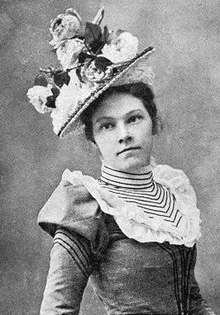Florence Riddick Boys
Florence Alice Riddick Boys (December 3, 1873 – May 10, 1963) was an American writer, clubwoman, suffragist, and state probation officer in Indiana.
Florence Riddick Boys | |
|---|---|
 | |
| Born | Florence Alice Riddick December 3, 1873 Litchfield, Minnesota |
| Died | May 10, 1963 Plymouth, Indiana |
| Other names | Florence R. Boys |
| Relatives | Carl Riddick (brother) |
Early life
Boys was born in 1873 in Litchfield, Minnesota, the daughter of Isaac Hancock Riddick and Alice Esther Wood Riddick. Her mother died shortly after Florence's birth; her father, a Methodist minister, remarried in 1876. Her brother Carl W. Riddick served one term in the United States Senate, representing Montana, and his son was politician and aviator Merrill K. Riddick.[1] In 1896 Florence Riddick graduated from her parents' alma mater, Albion College in Michigan, where she was editor of the school newspaper and "class poetess".[2][3]
Career

Journalism
After marriage, Boys moved to Plymouth, Indiana, where she lived for the rest of her life.[2] There, she wrote a column for the "woman's page" of the Plymouth Pilot and the Daily Republican, newspapers her husband published.[4] She wrote poetry, advice,[5] recipes, and essays for the papers.[6] Her women's page was syndicated for use in other newspapers in 1920.[7] Her features appeared in more than fifty papers by 1924,[8] and at its peak in 140 newspapers, including one in New Zealand, before she retired the feature in 1942.[9] She attended meetings of the Indiana Republican Editorial Association with her husband.[10]
Suffrage and politics
Boys was county chair the Woman's Franchise League in Plymouth.[3] After the suffrage campaign was won, she became the first Woman's Publicity Director for the Republican National Committee. She wrote for the National Republican, a weekly national newspaper produced by the party.[4][11] "If ever, in wistful mood, I sighed for a medium of expression, my wildest dreams have come true," she wrote of her work as a political press agent, in 1922; "one visualizes the great body of women voters keen to equip themselves in their new field of activity."[12] She was described as "one of the real national authorities of women in politics" when she addressed the Inland Daily Press Association in Chicago in 1923.[13] She was a delegate to the Republican National Convention in 1924, and an alternate delegate in 1932.[1] She wrote Why Watson? (1925), a book about politician James Eli Watson.[14]
Boys was Indiana's State Probation Officer from 1926[15] to at least 1931, leading work on juvenile delinquency in the state, lecturing, and editing the Indiana Probation News publication.[16][17][18] In the 1930s she chaired the Corrections and Public Welfare departments of the Indiana Federation of Clubs.[19][20]
Personal life
She married lawyer and newspaper publisher Samuel Evan Boys in 1898.[2] They had five children together, born between 1899 and 1914.[7] She died in 1963, aged 89 years, in Plymouth, Indiana.[21] Her papers are in the Indiana State Library.[3]
References
- "Riddick-Boys family of South Bend and Plymouth, Indiana". The Political Graveyard. Retrieved 2019-10-09.
- Chipman, Ida (January 16, 2007). "A Passion for Writing; Florence Boys Spent Early Years as a Typical Housewife". The South Bend Tribune. p. E1, E3. Retrieved October 9, 2019 – via Newspapers.com.
- Finding aid, Florence Riddick Boys Papers, Rare Books and Manuscripts, Indiana State Library.
- The Anchora Delta Gamma, Nov. 1924. Delta Gamma Fraternity. p. 100.
- Boys, Florence Riddick (October 27, 1922). "A Pen Piping and What To Do". Woman's Enterprise. p. 11. Retrieved October 9, 2019 – via Newspapers.com.
- Boys, Florence Riddick (1902). "Spring Love Song". In Hamilton, Edward Joseph (ed.). Indiana writers of poems and prose. University of California Libraries. Chicago : Western Press Association. pp. 218–219.
- "Publisher's Wife Edits Page". The Fourth Estate: 16. June 5, 1920.
- "Famous Woman Writer to Write for Republicans". The Indianapolis Star. August 17, 1924. p. 35. Retrieved October 9, 2019 – via Newspapers.com.
- "Untitled news item". The South Bend Tribune. January 8, 1942. p. 18. Retrieved October 10, 2019 – via Newspapers.com.
- "Indiana Editors Hold Winter Session". The Fourth Estate: 8. February 3, 1923.
- Freeman, Jo (2000). A Room at a Time: How Women Entered Party Politics. Rowman & Littlefield. p. 98. ISBN 9780847698042.
- Boys, Florence R. (November 4, 1922). "Woman Political 'Press Agent' Likes Job". The Fourth Estate: 15.
- "Inland Members Foregather at Convention". The Fourth Estate: 6. February 17, 1923.
- Boys, Florence Riddick (1925). Why Watson?. Indianapolis: Allied Printing. OCLC 247752859.
- "Woman Known Here is Given State Office". Palladium-Item. January 27, 1926. p. 7. Retrieved October 10, 2019 – via Newspapers.com.
- "Sixth Annual Report of the State Probation Department". Year Book of the State of Indiana for the Year ... Wm. B. Burford. 1926. p. 1104.
- "State Probation Officer Speaks". The Tribune. November 16, 1927. p. 1. Retrieved October 10, 2019 – via Newspapers.com.
- "State Probation Officer to Speak". The Star Press. March 19, 1931. p. 6. Retrieved October 9, 2019 – via Newspapers.com.
- "Untitled news item". The Indianapolis Star. July 13, 1934. p. 6. Retrieved October 10, 2019 – via Newspapers.com.
- "Public Welfare Chairman". The Star Press. March 15, 1936. p. 22. Retrieved October 9, 2019 – via Newspapers.com.
- "Mrs. Florence Boys Dies at Plymouth". Rushville Republican. May 11, 1963. p. 6. Retrieved October 10, 2019 – via Newspapers.com.